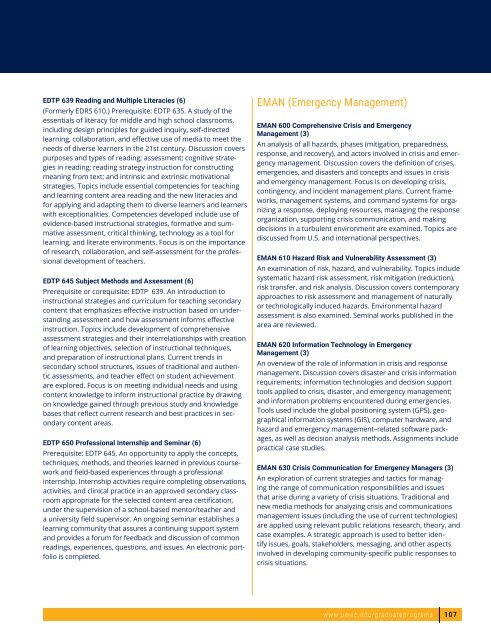2016–2017 2016–2017
2016-2017-graduate-catalog
2016-2017-graduate-catalog
Create successful ePaper yourself
Turn your PDF publications into a flip-book with our unique Google optimized e-Paper software.
EDTP 639 Reading and Multiple Literacies (6)<br />
(Formerly EDRS 610.) Prerequisite: EDTP 635. A study of the<br />
essentials of literacy for middle and high school classrooms,<br />
including design principles for guided inquiry, self-directed<br />
learning, collaboration, and effective use of media to meet the<br />
needs of diverse learners in the 21st century. Discussion covers<br />
purposes and types of reading; assessment; cognitive strategies<br />
in reading; reading strategy instruction for constructing<br />
meaning from text; and intrinsic and extrinsic motivational<br />
strategies. Topics include essential competencies for teaching<br />
and learning content area reading and the new literacies and<br />
for applying and adapting them to diverse learners and learners<br />
with exceptionalities. Competencies developed include use of<br />
evidence-based instructional strategies, formative and summative<br />
assessment, critical thinking, technology as a tool for<br />
learning, and literate environments. Focus is on the importance<br />
of research, collaboration, and self-assessment for the professional<br />
development of teachers.<br />
EDTP 645 Subject Methods and Assessment (6)<br />
Prerequisite or corequisite: EDTP 639. An introduction to<br />
instructional strategies and curriculum for teaching secondary<br />
content that emphasizes effective instruction based on understanding<br />
assessment and how assessment informs effective<br />
instruction. Topics include development of comprehensive<br />
assessment strategies and their interrelationships with creation<br />
of learning objectives, selection of instructional techniques,<br />
and preparation of instructional plans. Current trends in<br />
secondary school structures, issues of traditional and authentic<br />
assessments, and teacher effect on student achievement<br />
are explored. Focus is on meeting individual needs and using<br />
content knowledge to inform instructional practice by drawing<br />
on knowledge gained through previous study and knowledge<br />
bases that reflect current research and best practices in secondary<br />
content areas.<br />
EDTP 650 Professional Internship and Seminar (6)<br />
Prerequisite: EDTP 645. An opportunity to apply the concepts,<br />
techniques, methods, and theories learned in previous coursework<br />
and field-based experiences through a professional<br />
internship. Internship activities require completing observations,<br />
activities, and clinical practice in an approved secondary classroom<br />
appropriate for the selected content area certification,<br />
under the supervision of a school-based mentor/teacher and<br />
a university field supervisor. An ongoing seminar establishes a<br />
learning community that assures a continuing support system<br />
and provides a forum for feedback and discussion of common<br />
readings, experiences, questions, and issues. An electronic portfolio<br />
is completed.<br />
EMAN (Emergency Management)<br />
EMAN 600 Comprehensive Crisis and Emergency<br />
Management (3)<br />
An analysis of all hazards, phases (mitigation, preparedness,<br />
response, and recovery), and actors involved in crisis and emergency<br />
management. Discussion covers the definition of crises,<br />
emergencies, and disasters and concepts and issues in crisis<br />
and emergency management. Focus is on developing crisis,<br />
contingency, and incident management plans. Current frameworks,<br />
management systems, and command systems for organizing<br />
a response, deploying resources, managing the response<br />
organization, supporting crisis communication, and making<br />
decisions in a turbulent environment are examined. Topics are<br />
discussed from U.S. and international perspectives.<br />
EMAN 610 Hazard Risk and Vulnerability Assessment (3)<br />
An examination of risk, hazard, and vulnerability. Topics include<br />
systematic hazard risk assessment, risk mitigation (reduction),<br />
risk transfer, and risk analysis. Discussion covers contemporary<br />
approaches to risk assessment and management of naturally<br />
or technologically induced hazards. Environmental hazard<br />
assessment is also examined. Seminal works published in the<br />
area are reviewed.<br />
EMAN 620 Information Technology in Emergency<br />
Management (3)<br />
An overview of the role of information in crisis and response<br />
management. Discussion covers disaster and crisis information<br />
requirements; information technologies and decision support<br />
tools applied to crisis, disaster, and emergency management;<br />
and information problems encountered during emergencies.<br />
Tools used include the global positioning system (GPS), geographical<br />
information systems (GIS), computer hardware, and<br />
hazard and emergency management–related software packages,<br />
as well as decision analysis methods. Assignments include<br />
practical case studies.<br />
EMAN 630 Crisis Communication for Emergency Managers (3)<br />
An exploration of current strategies and tactics for managing<br />
the range of communication responsibilities and issues<br />
that arise during a variety of crisis situations. Traditional and<br />
new media methods for analyzing crisis and communications<br />
management issues (including the use of current technologies)<br />
are applied using relevant public relations research, theory, and<br />
case examples. A strategic approach is used to better identify<br />
issues, goals, stakeholders, messaging, and other aspects<br />
involved in developing community-specific public responses to<br />
crisis situations.<br />
www.umuc.edu/graduateprograms 107


